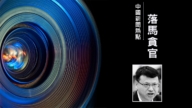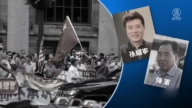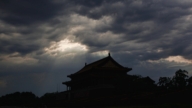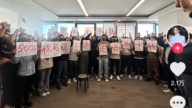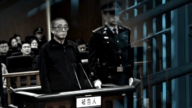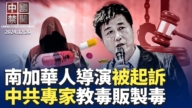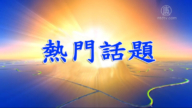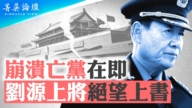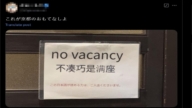【新唐人2013年05月30日訊】繼中共出臺「9號文件」規定「七不講」後,日前,多家中國媒體刊載,中共中央組織部、宣傳部和教育部黨組,聯合下發「十六條」意見,來加強高校青年教師的思想政治工作。有分析說,繼「七不講」後,「十六條」更直白表達當局思想控制的意圖。
5月4號,《關於加強和改進高校青年教師思想政治工作的若干意見》出臺。
「意見」指出:「少數青年教師政治信仰迷茫、理想信念模糊、職業情感與職業道德淡化……不能為人師表」,「意見」中強調,有關各級加強領導和管控,並要求教師「強化政治理論學習,深入開展馬克思列寧主義、毛澤東思想、中國特色社會主義理論體系教育,深入學習實踐科學發展觀」等。
河南駐馬店教師許鴻賓表示,這是中共當局要進一步加強思想管控,目地就是為了加強所謂「黨的領導」。
河南駐馬店教師許鴻賓:「是加強思想控制的一個辦法吧,和前面的『七不講』,是不是和那個有關係呀!青年教師好像思想比較活躍,好像是普世價值他們怕這個吧。不過我們感覺到好像是在這方面,往這方面使勁好像不大對頭,應該把關注的精力放在腐敗上。」
5月上旬,網上傳出中共當局對高校教師下達「七個不要講」內容,要求教師教學中不要講「普世價值、 新聞自由、公民社會、公民權利、中共的歷史錯誤、權貴資產階級、司法獨立」等。
據報導,「七不講」文件下發至縣團級,其中說道:宣揚「普世價值」的核心目地,是排除黨的領導;而「公民社會」的主張,是要在基層黨組織外,建立新的政治勢力;「新自由主義」理念,是反對國家進行宏觀調控;提倡「西方新聞觀念」,是反對黨一貫堅持的「喉舌論」,要擺脫黨對媒體領導,搞蘇聯當年改革時推行的「公開化」,用搞亂輿論來搞亂黨、搞亂社會。
時事評論員林子旭表示,從中大家可以看到一個規律,中共強調甚麼的時候,就說明中共在哪方面很薄弱了,甚至出現了危機。
時事評論員 林子旭:「中共撰文要求加強青年教師的思想政治工作,文章裡甚至用到了高度重視、切實加強等詞彙,這就是中共很明顯的在告訴大家,當下學校裡的青年教師的思想已經嚴重偏離了『偉、光、正』,這讓中共非常的恐懼,因為老師對整個社會的下一代影響非常大,這些老師的思想引導,就決定了中共的意識形態是不是還能繼續維持的問題。」
林子旭表示,他在上大學的時候已經感覺,三、四十歲的年輕教師大多有自己的思想,不管教甚麼課程的老師,和學生們熟悉了之後,他們往往會說出一些針砭時弊的話來,而且學生們對這些話非常感興趣。
林子旭:「到了今天,網路如此發達,這些年輕教師幾乎是人手一個智能手機,人人看微博,他們的思想一定是更加的活躍開放,接觸到了外部世界的信息以後,中共的那些宣傳在他們心裡就是垃圾。說白了,中共的思想和自由世界思想的矛盾,就是黨性和人性的矛盾。中共的那套連他們自己都不信的垃圾理論,就根本找不到市場了。」
「中國政法大學」青年講師、法學學者滕彪,對《德國之聲》表示,近期中共當局在意識形態領域,不斷透過御用文人之口傳遞出「七不講」、包括對青年教師思想管控的「十六條」,顯示出當局對網絡化時代自由言論難以控制的焦慮。
滕彪表示,任何一個正常而健康的社會,政治都不能干擾和綁架學術。他說,正常的社會,不可能用一種統一的意識形態,來控制整個教育、新聞、和宣傳系統,只有中國這種體制下,才有控制言論、統一思想的必要。
採訪編輯/常春 後製/王明宇
The CCP’s"Sixteen Recommendations" more Censors on Expression
Recently, the Chinese Communist Party (CCP) has imposed
the “Seven will not Speak"policy.
Following “Seven Don’t Mentions", the Central Committee’s
Organization Department, Propaganda Department and
the Ministry of Education jointly issued “16 recommendations"
which were published by several Chinese media.
The advise is to strengthen young professors’ ideological
and political works in the universities.
Analysts said that apart from “Seven Don’t Mentions",
the “16 recommendations" more directly expresses
the CCP’s intention on mind control.
On 4th May, “Advice on Strengthening and
Improving Young Professors’Ideological and
Political Works” (ADVICE) was issued.
ADVICE states: Some young professors confused
in political and ideology beliefs, professional emotion
and ethics have faded, thus,
they can’t serve as a model of virtue.
ADVICE stressed that the relative-levels must
strengthen the management and control.
It requires professors to strengthen the study of political
theory, deeply carrying out education of Marxism-Leninism,
Mao Zedong Thought and Chinese characteristic socialism.
As well as carrying out an in-depth study and
practicing the scientific development concept.
Xu Hongbin, a teacher in Zhumadian, Henan Province said that
the moves indicated that the CCP designed further
strengthening on ideological control.
Its purpose is to emphasize the CCP’s leadership.
Xu Hongbin: “It is a method the CCP uses to
strengthen the control of thought.
The question arises, whether it is connected with
the previous “Seven Don’t Mentions"?
Young professors seem to have active thinking,
the CCP may fear this based on universal values.
However, in this regard, we think it isn’t correct
to make any efforts in this direction.
They should focus on corruption issues."
In early May, the policy of “Seven Don’t Mentions" that
the CCP has imposed on university professors,
has been circulating on the internet.
It has instructed the professors not to teach seven subjects,
including “universal value, freedom of press, civil society,
citizen rights, past mistakes of the CCP, the privileged
capitalist class and judicial independence.
Sources said that"Seven Don’t Mentions"document
was issued down to the county-level.
Document stated that, to teach"universal value,
is to get rid of the Party-leadership;
The idea of “civil society" establishes
new political forces outside the CCP;
The “neo-liberalism" philosophy is
to go against the state macro-control;
Promotion of the “Western news concept" is to rule out
the CCP has consistently adhered on media control, and
is to follow the Soviet Union’s implementation of
openness reform,
as well as to mess up the CCP and
disturb society with public opinion.
Lin Zixu, current affairs commentator said that people can find
a theory from this: when the CCP emphasizes something,
it means the weakness on that area is more weakened,
furthermore, the CCP is facing a crisis.
Lin Zixu:"The CCP issues a document for young professors
to strengthen ideological and political works.
The document even uses words of “pay high attention"
and"earnestly strengthening".
It obviously tells everyone that, currently, in the universities,
young professors’ minds have seriously deviated from the CCP’s
so-called ways of always being “Great, Glorious and Correct. “
Lin Zixu said that when he studied at university,
he noticed that the majority of young professors had independent thought.
No matter which course of professors,
when they get familiar with students,
they would share their criticism from
their heart about current affairs.
The students were very interested in these topics.
Lin Zixu: “Nowadays, the network is very advanced,
each young professor almost has a smart phone in hand.
They read microblogs with their thoughts
being very active and open.
After they read the outside world’s information,
the CCP’s propaganda becomes rubbish in their mind.
Put it simply, the CCP’s ideology contradicts with
the one from the free world. It is the CCP and humanity’s contradiction.
The CCP’s garbage ideology which even itself doesn’t believe,
is finding it impossible locate a market."
Teng Biao, a young lecturer in China University of
Political Science told Deutsche Welle that recently,
the Chinese regime constantly promotes
“Seven Don’t Mentions" via its writers,
including the promotion of its “16 recommendations".
It indicates the CCP worries that free expression in
the networking era is beyond its control.
Teng Biao said that in any normal and healthy society,
politics wouldn’t interfere and control the academic field.
Teng said that in a normal society, it is impossible
to use one ideology to control the entire education,
press and propaganda systems.
Only within the CCP’s system, the CCP thought it is
necessary to control expression and unify thought.


